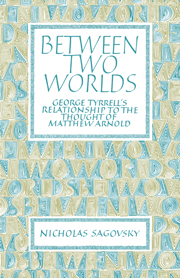Book contents
- Frontmatter
- Contents
- Acknowledgments
- Abbreviations and note on references
- 1 Tyrrell and Arnold ‘between two worlds’
- 2 The history of an opinion
- 3 ‘Definite evidence’
- 4 Fundamental convergence: epistemology and metaphysics
- 5 The life of the spirit: ecclesiology and culture
- 6 Christology: the parting of the ways
- 7 God, and ‘the Power that makes for Righteousness’
- 8 Conclusions
- Appendix Two letters to the Abbé Venard
- Notes
- Select bibliography
- Index
6 - Christology: the parting of the ways
Published online by Cambridge University Press: 23 October 2009
- Frontmatter
- Contents
- Acknowledgments
- Abbreviations and note on references
- 1 Tyrrell and Arnold ‘between two worlds’
- 2 The history of an opinion
- 3 ‘Definite evidence’
- 4 Fundamental convergence: epistemology and metaphysics
- 5 The life of the spirit: ecclesiology and culture
- 6 Christology: the parting of the ways
- 7 God, and ‘the Power that makes for Righteousness’
- 8 Conclusions
- Appendix Two letters to the Abbé Venard
- Notes
- Select bibliography
- Index
Summary
In a brief book entitled Modernism: Its Failure and Its Fruits Maude Petre summarised the unquestioned assumptions of the Catholic understanding of Christ with which she had grown up. At the head came:
the historical fact of the Resurrection:…if we could not be sure that the dead body of Christ actually rose from the tomb, the very foundation of our faith was insecure. Secondly, we were taught that Christ definitely affirmed His own Divinity…Thirdly, in virtue of the Hypostatic Union, He possessed, even as man, a certain omniscience…If He spoke, in [the Gospel] records, as though He only possessed the knowledge of His own time, that was in no way because only such knowledge was present to His mind, but because He had to speak to men in their own language. Fourthly, the Church was His direct foundation; her hierarchy and her sacraments were His direct institution: every one of her definitions was, explicitly or implicitly, included in His teaching.
She goes on to show, principally from the works of Loisy, though she might almost as well have done it from the works of Tyrrell, how all these hitherto unshakeable facts were questioned in the name of historical science by Modernist writers.
The atmosphere in which Matthew Arnold grew up would have been rather different. Certainly, the ‘historical fact’ of the resurrection would not have been questioned, nor would the explicit claims to divinity of the Johannine Christ.
- Type
- Chapter
- Information
- Between Two WorldsGeorge Tyrrell's Relationship to the Thought of Matthew Arnold, pp. 89 - 115Publisher: Cambridge University PressPrint publication year: 1983

